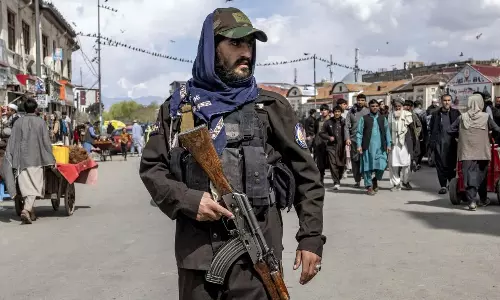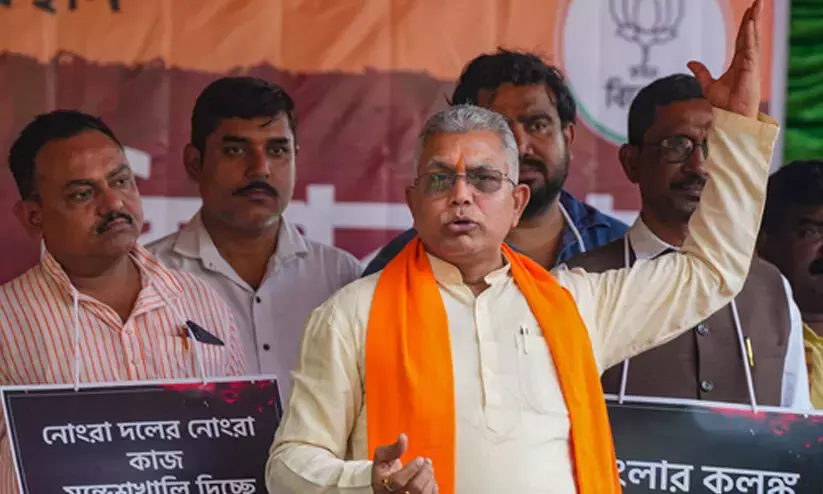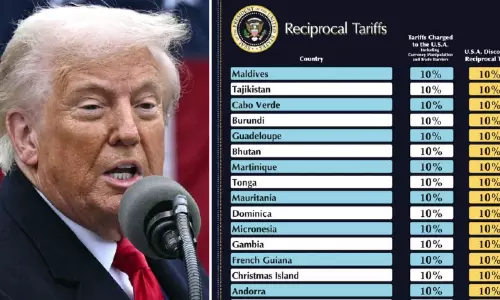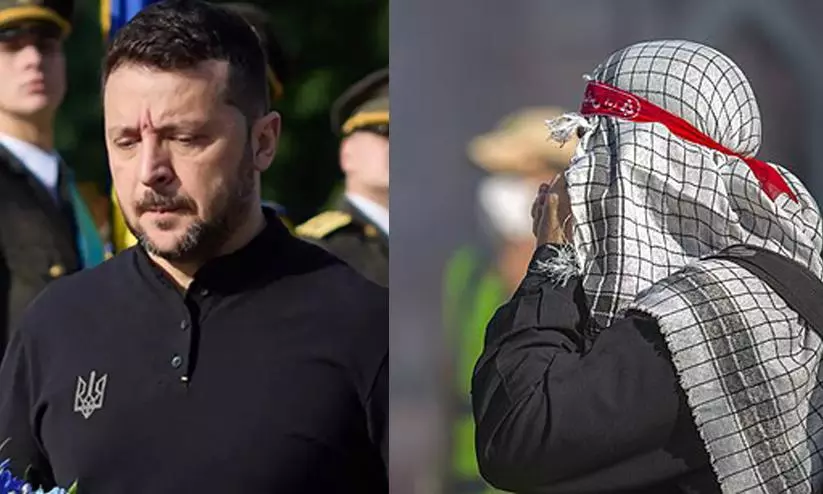
Syria shifts focus from genocide in Gaza, looming defeat in Ukraine
text_fields“Assad has fled his country. His protector Russia was not interested in protecting him any longer.” This is the President-elect Donald Trump’s observation on the events in Syria. How will these words echo with President Volodymyr Zelensky fighting with his back to the wall in Ukraine? If Russia can drop Assad, will Trump keep an albatross around his neck?
Meanwhile, Benjamin Netanyahu, literally fighting with his back to the wall with Hezbollah and Hamas, has exulted: “Assad’s fall reverses the most important part of the ‘Shia’ axis with Iran.” The Israeli premier’s exultation would ring true if Iran had not been polite in its goodbye to Assad. With usual subtlety, Iran has distinguished between Assad and Syria.
Quite in sync has been the statement by the leader of the rebels Abu Mohammad al Jolani, much the most important rebel leader. His refrain “Syria is for all Sunnis, Alawis, Christians, Druze” has found wide traction.
The earthshaking news that Assad’s fall has promoted is, quite ironically, the abrupt disappearance from the front page of two wars that have kept the world in their thrall. Why should a war inching towards a nuclear exchange be abruptly taken off the air waves? Because the West was losing?
Not only are the Syrian developments a welcome diversion for the West from wars that were not going well for the West. Assad’s fall also has the potential of being spun as a vindication of the Arab Spring. “Get out of the way, Assad” ordered Secretary of State Hillary Clinton. She can now claim to have been vindicated, even though the circumstances in 2011 were totally different.
The growing consensus among non-mainstream media experts is this: the Western effort in Ukraine is not to accept an obvious defeat. Moreover, everything has to avert a debacle. The new treasure trove in cash and weaponry to Kyiv, would, in Trump’s parlance, be tantamount to throwing good money after bad.
He is quiet for a simple reason: he would like to negotiate honourably with Putin. He would not like to throw in the towel but have Zelensky on his feet walk towards Putin to strike a bargain however degrading which the pliant media will sell with favourable headlines.
Of course, there is a pall of mist on the rapidity with which Assad fell. The almost cheerful appearance of Assad and his wife granted asylum in Moscow tells its own tale. Russian bases in Syria have been promised full protection by the incoming regime in Damascus.
Stories of vandalism of the Iranian embassy appear to be solo incidents without any organizational support.
There are so many fingers in the Syrian pie that it is difficult to spot the master choreographer. That Russia has vital interests in Syria as it does in Ukraine makes it the key author of the surprising turn.
Two other developments in the region have been marked by their masterly stealth: Riyadh-Tehran rapprochement and the coming together of all Palestinian groups ranging from Hamas to the Palestinian authority. Both these arrangements were painstakingly stitched together by China. Never in history have China and Russia been closer.
There have been plenty of agreements on issues stretching from Ukraine to the East Mediterranean. Take the Astana process for Syria, for instance, between Russia, Iran and Turkey.
In the deal, a crucial player is also Turkey. So far, standing four squares behind Hamas as it faces history’s first live televised genocide, have been the following: Iran, Hezbollah, Hazb al Shaabi (Iraq) and the Houthis of Yemen – all Shia variants. A prominent role being assigned to Turkey in Syrian affairs brings a major Sunni country into focus. Recep Tayyip Erdogan’s profile receives a boost. Is Azerbaijan part of the deal with Turkey where Iranian interests are considerable?
Russians along with Turkey and Iran appear to have played an amazing hand. Assad’s fall provides a face-saver for Israel and US in West Asia and for the West in Ukraine.
The chaotic situation in Georgia where the President Salome Zourabichvili refuses to accept the pro-Russia verdict of the national elections held in October. This is not the only flashpoint President Trump faces when he enters the White House. The US’s key interest in the Pacific Basis has been blown to Smithereen, by inept politics in South Korea.
Former State Department spokeswoman Victoria Nuland’s handiwork in Ukraine is tearing apart. Likewise, Donald Lu Under Secretary of State for South Asia has egg on his face for the explosive situation developing in Bangladesh. Pakistan and Afghanistan are on edge as are Romania,and Moldova. Having called snap elections President Emanuel Macron finds himself without a government in France because he will not have a leftist Prime Minister. Fascism stares Germany in the face.
This incomplete list of the world’s chaotic spots is simply to place in balance the dwindling G7 and the expanding BRICS.
Is isolationism implicit in Trump’s clarion call – “Make America great again?
The US has faced decline but it bounced back under Ronald Reagan.
The fall of the Soviet Union, for reasons of its own, brought the US into focus as the Sole Superpower. The collapse of Lehman Brothers in 2008 signalled the flaws in the Neo-Cons mismanagement of globalization.
Trump would do well to remember his conversation with Jimmy Carter. “The Chinese are going ahead of us”, Trump lamented. “What should we do?” Carter’s reply was succinct. “Except for one skirmish with Vietnam in 1979, China has not fought a war; we have never stopped being at war.”
The US’s 760 bases worldwide and wars without end were glibly explained: the Military Industrial Complex has to be kept busy. Defeats in Vietnam, Iraq, Afghanistan, Ukraine, Iraq, Afghanistan, and Ukraine should cause military analysts to pause.
The recent relentless bombardment of the Gaza Strip by one of the great military powers, without achieving any of its war aims and heaping upon itself the odium of an Apartheid state committing genocide for over a year on live television defies description. How will Trump cope?























